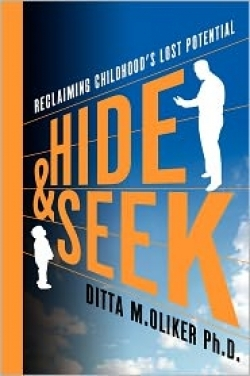Hide & Seek
Reclaiming Childhood's Lost Potential
Many people have issues in their lives that seem impervious to change. Difficulties handling money, losing weight, or relating to a spouse can all lead an individual to question who they are and why they cannot improve their situation. In Hide & Seek, clinical psychologist Ditta M. Oliker presents the idea that problems and issues that are present in the life of an adult are often the result of hidden beliefs developed by the subconscious self during childhood in order to survive in difficult or painful situations. As one grows into an adult, it becomes necessary to seek out those beliefs and understand how they came to be. Through this process, erroneous beliefs that no longer serve to protect an individual can be changed and each person can grow to reach his or her greatest potential.
The book is divided into three parts. The first part deals with self-examination and helps readers to understand how each of us develops into a unique person. Concepts such as explicit and implicit knowing are presented along with information on attachment and the concrete way in which children think and perceive their world. Darwin’s theory of natural selection is explained, because according to Oliker, “What is true of survival in the physical world, is also true in the psychological world. Grasp the meaning of Darwin’s concept of survival and you begin to understand the meaning and power of a psychological survival system.”
The second part of the book presents the three elements of a survival system: personality, environment, and the interaction of personality and environment. The third part offers a series of nine steps to assist the reader in identifying whether or not they have a personal survival system, and if so, how to break free from it.
The theory presented in Hide and Seek is eye-opening and will make sense to many readers. It is logical to assume that psychological adaptations from childhood will continue into adulthood if no thought or circumstance occurs to change them. The author has explained her theory very well, using a series of patient stories to illustrate different ways in which survival systems adopted during childhood became detrimental to the adults who subconsciously held on to them. She clearly lists important points to her theory and specific actions to address each. This book will help many readers begin to recognize behaviors in their own lives that may stem from a need to protect the child they once were. Dr. Oliker’s first book is a valuable and unique contribution to the field of psychology.
Reviewed by
Catherine Thureson
Disclosure: This article is not an endorsement, but a review. The publisher of this book provided free copies of the book and paid a small fee to have their book reviewed by a professional reviewer. Foreword Reviews and Clarion Reviews make no guarantee that the publisher will receive a positive review. Foreword Magazine, Inc. is disclosing this in accordance with the Federal Trade Commission’s 16 CFR, Part 255.

